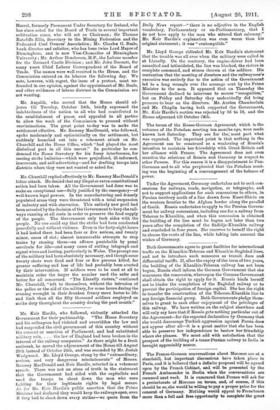Mr. Churchill replied effectively to Mr. Ramsay MacDonald's bitter attack.
He denied that any illegal or extra-constitutional action had been taken. All the Government had done was to make an exceptional use—fully justified by the emergency—of well-known legal powers. In the manufacturing and densely populated areas they were threatened with a total suspension of industry and with starvation. This entirely new peril had been arrested by the decision of the Government to keep the rail- ways running at all coats in order to preserve the food supply of the people. The Government only took sides with the people. No one could say that the strike had been conducted peacefully and without violence. Even in the forty-eight hours it had lasted there had been four or five serious, and twenty minor, cases of riot; almost innumerable attempts to stop trains by stoning them—an offence punishable by penal servitude for life—and many cases of cutting telegraph and signal wires and looting, particularly in Wales. The prompt use of the military bad been absolutely necessary, and though some twenty shots were fired and four or five persons killed, far areater suffering and loss of life had probably been averted by their intervention. If soldiers were to be used at all to maintain order the larger the number used the safer and better for all concerned. "The Llanelly rioters," continued Mr. Churchill, "left to themselves, without the intrusion of the police or the aid of the military, for some hours during the evening wrought in their drunken frenzy more havoc to life and limb than all the fifty thousand soldiers employed on strike duty throughout the country during the past month."


































 Previous page
Previous page